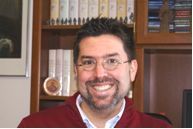
The son of Zebedee, a fisherman, and Salome, daughter of a temple priest, James was the older brother of Saint John. According to many scholars, Salome was the sister of the Virgin Mary, making James and his brother John cousins of Jesus. This might account for Salome’s request that they be given privilege in the Kingdom as well as Jesus’ request from the cross that John care for His mother.
In the synoptic gospels James is called along with his brother John to leave their father and their nets and become Jesus’ disciples. He is often listed, along with Peter and John, as members of a privileged group closest to Christ. He was present at the raising of Jairus’ daughter, the Transfiguration, and the agony in the garden.
He was martyred in 44 when Herod Agrippa I, son of Aristobulus and grandson of Herod the Great, sought to please the Jews of Jerusalem by persecuting the Christian church. As a prominent leader of the growing Christian sect, James was beheaded, the first victim in this campaign. According to tradition, when James’ accuser led him to the judgment seat he was so moved by James’ confession that he became a Christian on the spot and shared James’ fate.


